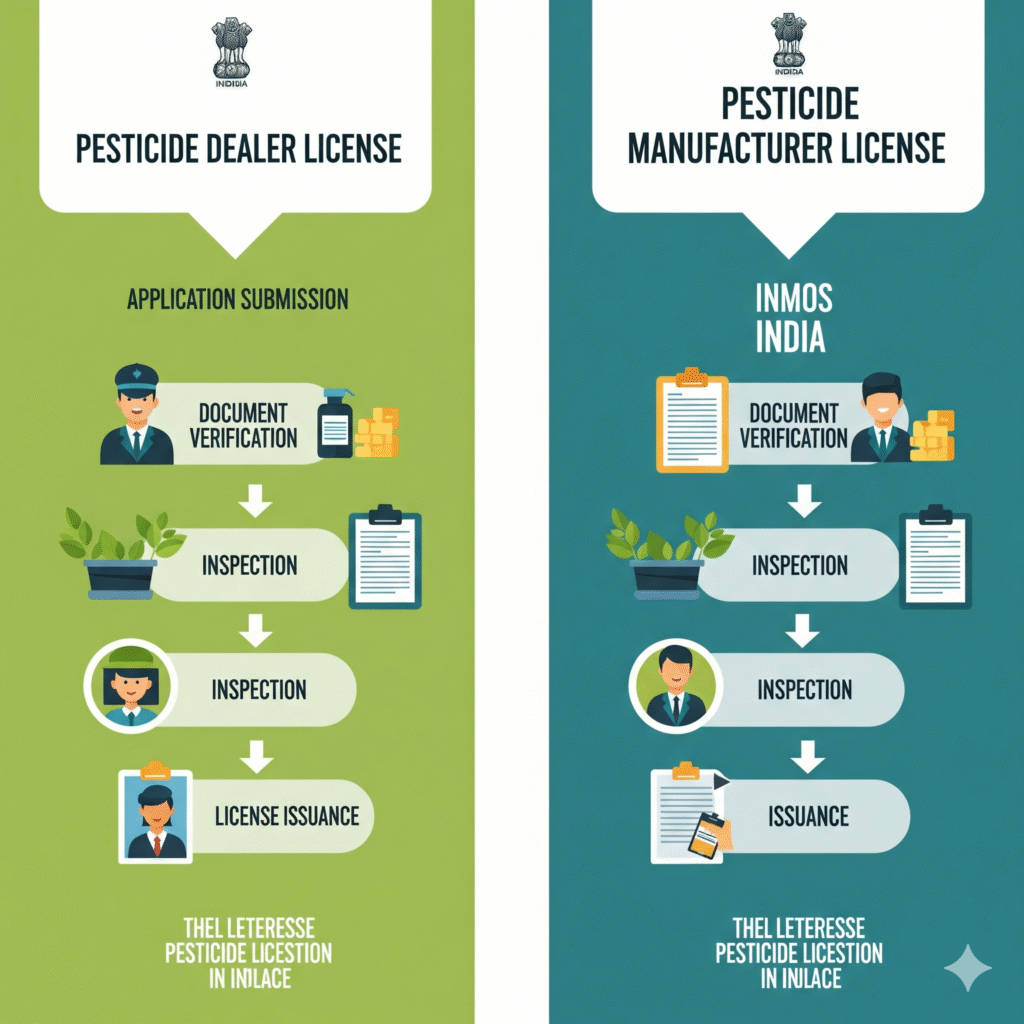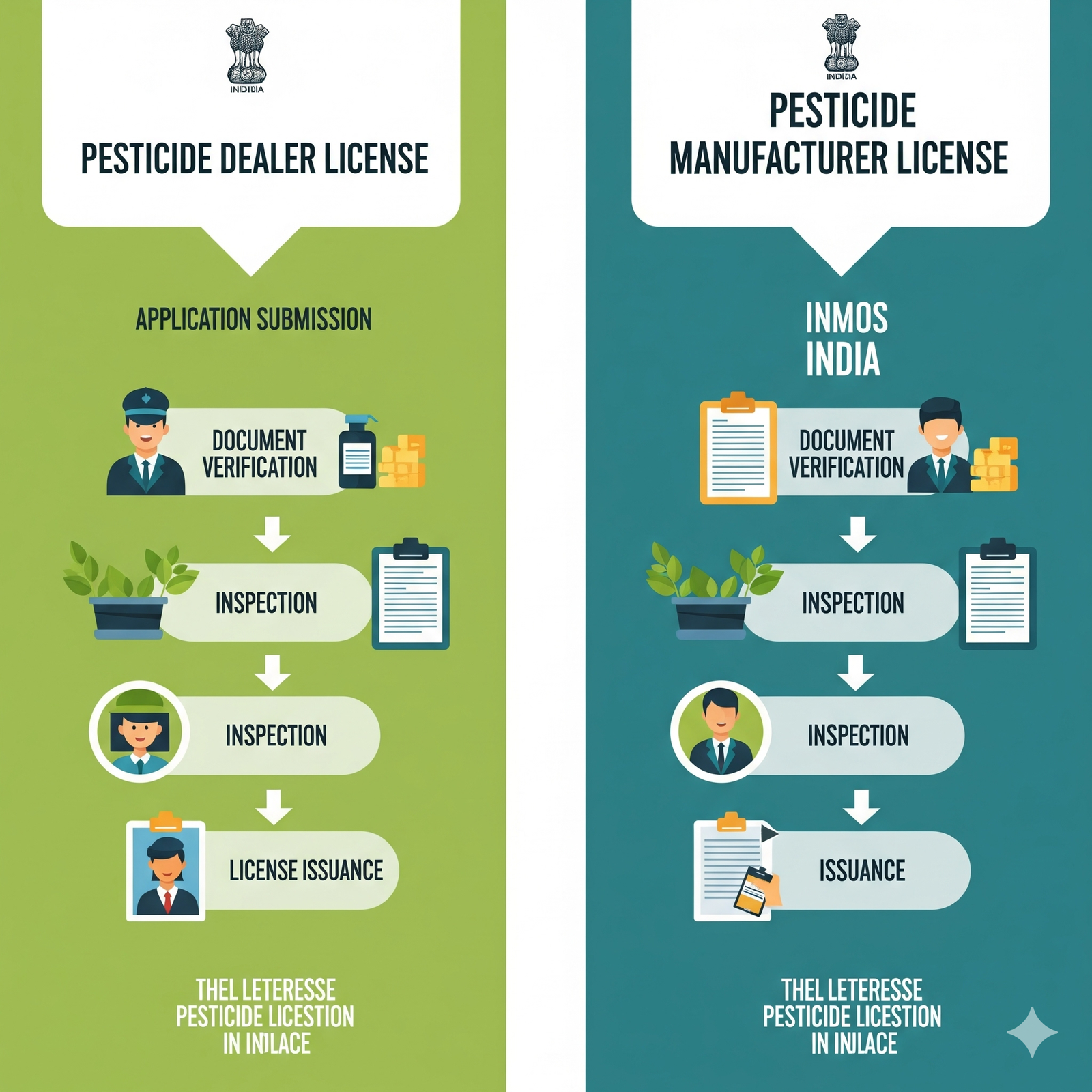
Introduction
Agriculture is the backbone of India, supporting millions of farmers and feeding the country. To increase productivity and protect crops, the use of pesticides has become common. However, pesticides contain chemical substances that, if misused, can harm farmers, the environment, and consumers.
This is why the Government of India enforces strict regulations on the sale, distribution, import, and manufacturing of pesticides. The Insecticides Act, 1968 and the laws framed under it make it compulsory to obtain a Pesticide License in India before anyone can sell, stock, manufacture, or distribute pesticides.
A pesticide license is not just a piece of paper—it signifies compliance with legal standards, ensures that only trained and authorized businesses trade in pesticides, and protects farmers from spurious or hazardous chemicals.
In this comprehensive guide, we will explain what a pesticide license is, types of pesticide licenses in India, eligibility, documents required, step-by-step application process, compliance rules, penalties for non-compliance, benefits, and FAQs. Whether you are a dealer, manufacturer, or importer, you will find this blog a practical roadmap to getting your license successfully.
👉 Apply for Pesticide License Online with Expert Assistance → [Apply Now]
Pesticide License Registration in India – Apply Online
Get your Pesticide License in India easily with our expert assistance. We help manufacturers, wholesalers, retailers, importers, and dealers obtain Insecticide/Pesticide Registration & License under the Insecticides Act, 1968. 100% online process. Fast approval. Lowest price.
What is a Pesticide License?
A Pesticide License in India is an official authorization issued by the State Agriculture Department or Central Government authority, permitting individuals or businesses to sell, stock, manufacture, import, or distribute pesticides (also technically known as insecticides).
Under the Insecticides Act, 1968, no person or company can deal in pesticides without obtaining a license. This ensures:
- Only registered and quality-checked pesticides are available in the market.
- Farmers receive genuine products with correct labeling and usage guidelines.
- Dealers, manufacturers, and importers follow safety and storage norms.
Who Issues the License?
- For Dealers – The license is issued by the State Agriculture Department.
- For Manufacturers & Importers – Central authorities such as the Central Insecticides Board & Registration Committee (CIBRC) play a role.
Essentially, every entity in the supply chain—wholesalers, retailers, distributors, importers, and manufacturers—needs approval before operating.
Types of Pesticide Licenses in India
To understand the system better, let’s look at the key types of pesticide licenses in India:
1. Pesticide Dealer License
- Issued to wholesalers, retailers, and distributors who sell pesticides directly to farmers or other businesses.
- Requires technical qualifications (at least one trained person with relevant education).
- Storage facilities such as a godown or warehouse are mandatory.
2. Manufacturer’s License
- Required for pesticide companies that manufacture insecticides within India.
- Demands high-level infrastructure, qualified staff, testing facilities, and approval from regulatory authorities.
3. Importer’s License
- Needed when pesticides are imported into India from other countries.
- Requires prior registration with the Central Insecticides Board and compliance with customs/import rules.
👉 Key Distinction:
- Dealers sell pesticides.
- Manufacturers produce them.
- Importers bring them into India.
Eligibility Criteria for Pesticide License
If you plan to apply for a pesticide license in India, you must meet certain criteria.
Dealers (Retailers/Wholesalers):
- At least one qualified technical person must be employed. This usually means a person with a degree in agriculture or science (chemistry/biology).
- Applicants must own or have access to a storage facility for safe stocking.
- Shops should follow prescribed infrastructure guidelines.
Manufacturers:
- The applicant should have a registered manufacturing unit with proper equipment and safety mechanisms.
- A qualified chemist/agronomist is mandatory.
Importers:
- Must have prior registration with CIBRC.
- Import documents and agreements with foreign manufacturers are required.
Restrictions:
- No person can get a pesticide license if they have been convicted under pesticide laws.
- Fake, misleading, or spurious product dealers are prohibited.
Documents Required for Pesticide License
To avoid rejection, applicants must submit a complete set of documents.
Common Documents (for all licenses):
- PAN Card & Aadhaar Card of applicant.
- Passport-size photographs.
- Valid GST Registration Certificate.
- Shop/office address proof.
- Rent agreement or ownership proof of premises.
For Dealers:
- Proof of storage facility (layout, compliance certificate, godown proof).
- Educational certificate of technical person (Degree/Diploma in Agriculture/Science).
- Partnership deed / incorporation certificate (if company).
For Manufacturers:
- Incorporation certificate, MoA/AoA.
- Details of plant, machinery, and equipment.
- Qualification certificates of technical staff.
- Pollution clearance certificates, if required.
Importers:
- CIBRC registration.
- Import-export code (IEC).
- Agreement with foreign supplier.
Step-by-Step Process of Pesticide License Application
Now let’s cover the practical step-by-step pesticide license application process in India.
Step 1 – Prepare the Documents
Collect identity proof, educational qualification, business registration, storage facility details, and technical personnel appointment letter.
Step 2 – Application Form (Form II)
Under the Insecticides Act, 1968, every dealer must apply in Form II. Manufacturers and importers follow different application formats.
Step 3 – Submission of Application
Submit the completed application with documents to the State Agriculture Department (for dealers) or to CIBRC (for manufacturers/importers). Many states allow apply pesticide license online through agri department portals.
Step 4 – Inspection of Premises
Government officials will inspect the location for safety, hygiene, and infrastructure compliance.
Step 5 – Grant of License
After scrutiny, the authority issues the pesticide license with a unique license number. You can then legally operate your business.
👉 Pro Tip: Hire a consultant to handle this step—most delays and rejections occur due to documentation errors.
Validity & Renewal of Pesticide License
- Validity: Typically 2 to 5 years, depending on the state.
- Renewal: Apply at least 30–60 days before expiry. Submit renewal form with documents and fee.
- If Not Renewed: The license expires, operations become illegal, and penalties will apply.
Compliance Requirements for Pesticide Dealers & Manufacturers
Holding a pesticide license is only the beginning. You must comply with ongoing obligations:
- Maintain stock and sales registers.
- Display the license prominently at the shop.
- Sell only approved pesticides registered under the Insecticides Act.
- Keep records of suppliers and customers.
- Submit periodic returns/reports to the agriculture department.
Penalties for Non-Compliance under Insecticides Act
Failure to obtain or maintain a pesticide license in India can result in strict penalties, such as:
- Suspension or cancellation of license.
- Seizure of pesticide stock.
- Monetary fines up to lakhs of rupees.
- In serious violations, imprisonment is possible.
Benefits of Obtaining a Pesticide License
Obtaining the license offers multiple advantages:
- Legal compliance – no risk of penalties.
- Customer trust – farmers prefer licensed dealers.
- Business expansion – opportunity to distribute across districts/states.
- Government schemes – eligibility for subsidies, tenders, and contracts.
Role of Consultants in Pesticide License Application
Applying for a pesticide license can often feel complex due to differences in state laws, paperwork, and inspections. Consultants can:
- Prepare documents correctly.
- Liaise with state departments.
- Reduce rejection risk.
- Speed up approval.
👉 Apply for Pesticide License Online with Expert Assistance → [Apply Now]
Common Mistakes Applicants Make
- Submitting incomplete or wrong documents.
- Not appointing a qualified technical person.
- Poor infrastructure of storage godowns.
- Late renewal application.
- Misunderstanding between dealer, importer, and manufacturer requirements.
FAQs on Pesticide License in India
Here are some frequently asked questions about pesticide license in India:
- How can I get a pesticide license in India?
You must apply to the State Agriculture Department with documents and Form II, followed by inspection and approval. - Is pesticide dealer license mandatory?
Yes, for anyone selling or stocking pesticides. - What is the validity of a pesticide dealer license?
Generally 2–5 years, depending on state law. - Can I apply for pesticide license online?
Yes, many states have online application portals. - What are the documents required for pesticide license?
PAN, Aadhaar, GST, storage proof, educational qualification of technical person, partnership deed/incorporation certificate, etc. - Who issues pesticide license in India?
State Agriculture Department for dealers; CIBRC for manufacturers/importers. - Do wholesalers also need license?
Yes, both wholesalers and retailers require a pesticide dealer license. - What is the fee for pesticide license application?
Varies by state (commonly in the range of ₹500–₹5,000).
FAQs on Pesticide License
- Can I sell pesticides without license?
No. It is illegal and attracts penalties. - Do I need a separate license for different districts?
Yes, licenses are often location-specific. - What are penalties for selling pesticides without license?
Heavy fines, suspension, and imprisonment. - What is Form II in pesticide license application?
The prescribed application form under Insecticides Act, 1968. - Is LIC-qualified person necessary for license?
Yes, a technically qualified person is mandatory. - Can companies get a pesticide license?
Yes, both individuals and companies can apply. - What happens if license is not renewed?
It becomes invalid, and you cannot legally sell pesticides. - What is CIBRC?
Central Insecticides Board & Registration Committee – approves pesticide molecules and import/manufacture licenses. - Can I add new pesticides to my license later?
Yes, by applying for endorsement/modification. - Is online pesticide license faster than offline?
Usually yes, as processing is streamlined. - Do manufacturers and importers follow the same process?
No. Manufacturers and importers must apply with central authorities, while dealers apply to state departments.
Conclusion
The Pesticide License in India is not only a legal requirement but also a mark of responsibility and professionalism in the agri-business sector. Whether you are a dealer supplying farmers, a manufacturer producing pesticides, or an importer bringing new products to Indian markets, licensing ensures safety, compliance, and business growth.
👉 If you are planning to apply, don’t struggle with paperwork and compliance—Apply for Your Pesticide License in India Online with Expert Guidance → [Apply Now]


Leave a Reply